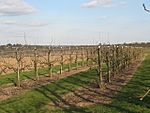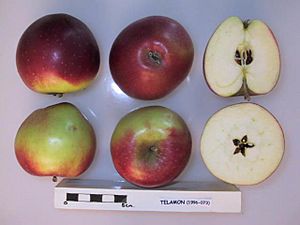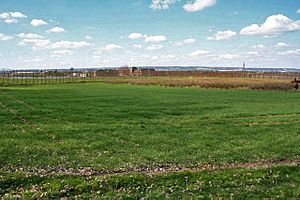East Malling Research Station facts for kids

An Orchard at East Malling
|
|
| Abbreviation | NIAB EMR |
|---|---|
| Formation | 1913 |
| Type | Research institute |
| Legal status | Private company (09894859) and registered charity (1165055) |
| Purpose | Horticulture research in the UK |
| Headquarters | East Malling |
| Location |
|
|
Region served
|
global |
|
Membership
|
Horticultural scientists |
|
Managing Director
|
Professor Mario Caccamo |
|
Parent organization
|
NIAB |
|
Staff
|
100 |
NIAB EMR is a special place in East Malling, Kent, England. It's a research center that studies plants, especially fruits and crops that grow from cuttings. Since 2016, it has been part of the NIAB Group.
History of Plant Research
The East Malling and Wye Fruit Experimental Station started in 1913. It was built on 22 acres of land bought by the Kent County Council in East Malling. At first, it was managed by Wye College.
In 1914, Ronald Hatton became the director of the station. He believed in doing deep scientific research. He also cared about the people who worked with plants. The station became independent from the college in 1921.
The first buildings from 1913 are still used today. Many important discoveries about plants that live for many years have happened here. This has made East Malling famous around the world.
Some of the best-known discoveries include:
- Better ways to grow plants.
- New methods for growing fruit plants, especially by developing rootstocks.
- Creating new types of fruits and ornamental plants.
- Improved ways to store fruit.
- Learning about and controlling plant pests and diseases.
From 1990, a part of Horticulture Research International (HRI) was on the site. HRI closed in 2009. In 2016, East Malling Research joined the National Institute of Agricultural Botany (NIAB) group.
Understanding Apple Rootstocks
In 1912, Ronald Hatton began important work on apple tree rootstocks. A rootstock is the part of a plant, usually the root and lower stem, onto which another plant is grafted. This helps control how big the tree grows and how well it produces fruit.
With help from Dr. Wellington, Hatton fixed problems with how apple rootstocks were named. They also sorted out mixtures of different types that were common in Europe. These correctly identified rootstocks are now known as the "Malling series". The M9 rootstock became one of the most widely used types.
Location of NIAB EMR
NIAB EMR is located east of East Malling. It is north of the Maidstone East Line railway. The western part of the site is in East Malling and Larkfield, and the eastern part is in Ditton. It is just south of the A20 road. It is also between junctions 4 and 5 of the M20 motorway.
See also
 In Spanish: East Malling Research Station para niños
In Spanish: East Malling Research Station para niños
 | Leon Lynch |
 | Milton P. Webster |
 | Ferdinand Smith |



